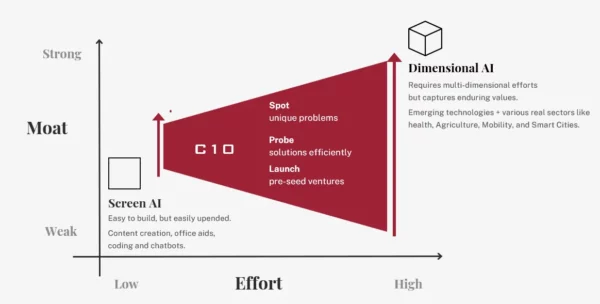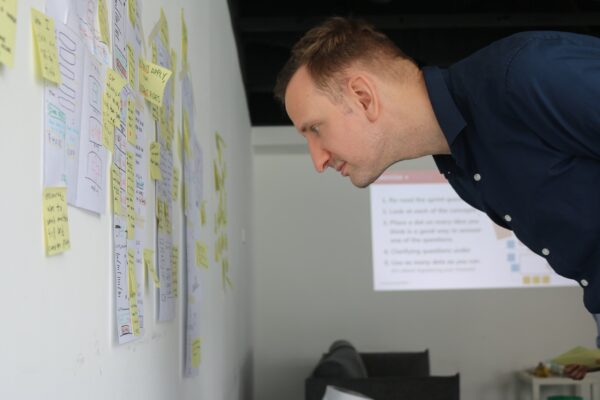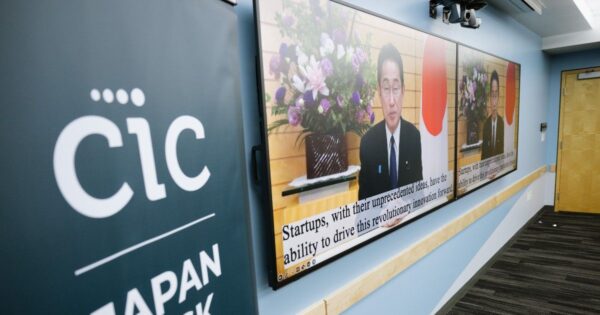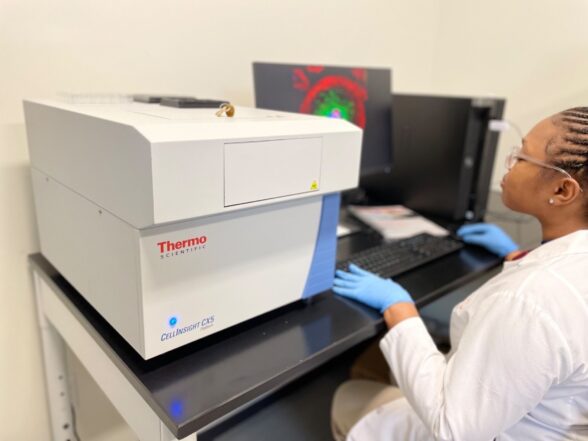How do Leaders at These Visionary CIC Companies Manage Remote Employees? We Found Out.
This guest post was written by Ideometry, a full-service digital marketing agency located at CIC Boston that helps awesome companies amplify their growth strategies.
Over the last decade, remote work has become a fact of life for most companies. Today, the question for both startups and established businesses isn’t “should we allow remote work?” but rather, “how can we more effectively manage our decentralized workforces?”
Managing a remote team has its own unique challenges, and to learn more about how we can all better navigate those challenges, we turned to leaders at some of CIC‘s most exciting companies to learn how they manage projects with a national or global team, and how they build a strong work culture without a centralized workplace.
David Delmar, Founder, Resilient Coders
David is a professional designer and interface developer with experience working with award-winning startups, as well as established brands. Before founding Resilient Coders, he was at PayPal, leading a cross-disciplinary team of designers and coders.
How do you manage projects with remote employees and teams?
DD: Finding an effective way to manage remote employees is extremely dependent on the personality of the people on the team. Having the right people definitely has an impact on the success of remote working.
You have to find out what motivates people. There are people who are motivated by team contributions, for example. That’s hard to establish when people are remote because there’s a thinner emotional connection between the members of the team.
Say someone has to meet a deadline for part of a project. If they don’t meet the deadline, what happens? Everyone gets messed up. If they’re remote, they don’t necessarily see that up close – they don’t see the frustration and scrambling that occurs when everyone else has to pick up the slack.
When you’re with people and are in the trenches, you have a deeper empathy because you can see the full impact of your actions – both good and bad. If you’re remote, you worry about the missed deadline messing up the project. If you’re with people and have an emotional connection, you worry about the missed deadline and letting your team down. There’s a big difference between the two in terms of motivating people to work well.
How do you develop a strong team culture among remote teams?
DD: I attended a conference a few years ago where I learned about the four personality styles: Direct, Spirited, Systematic, and Considerate. If you’re good at managing a team, you know which quadrant all of your employees represent. Most people have elements of a few of these styles, but will usually lean more heavily toward just one.
Direct people are straight-to-the-point: very project and product-focused and care about hitting deadlines. Spirited people are great storytellers, motivators, and persuaders who tend to be motivated by recognition and glory. Systematic people are almost Vulcan-like–they back things up with data and numbers, and they’re generally motivated by being right about things. Considerate people are great listeners and generally use supportive language when talking to people–they care very much about seeing the team as a whole win.
You have to interact with and reward people based on what’s most important to them.
Rich DiTieri, CEO, Startup Institute
Having dabbled in entrepreneurship since high school and having earned his B.S. in Management for Technological Entrepreneurship at Rensselaer, Rich left technology consulting at Deloitte to co-found Pintley, a 2011 MassChallenge Winner,which he later sold. A jack-of-all-trades, master of some, Rich has worked in education, healthcare, IT, payments, is a sales and business development mentor, and loves Lean. In his time at Startup Institute, he’s designed the global partner experience, directed the Boston program, and mentored hundreds of graduates.
How do you manage projects with remote employees and teams?
RD: Remote work or letting people work from home works in some situations, but I advocate having people in-person whenever possible. In my experience, having remote teams works best when you have super defined, clear processes. If you’re a startup that’s still trying to figure out how to best work in general, it’s even harder to manage people through all of that ambiguity if they aren’t right there with you.
To keep people on the same page, you need at least weekly meetings with remote employees, though quick daily standups can be even better. It’s not that people need to be coddled – they just need to feel like they’re part of a team, and this is especially true in development and sales.
Having the right tools is hugely valuable for having daily standups. Sometimes, it might feel like wanting to talk with remote employees every day is micro-managey, but being in touch so routinely and staying on top of things can actually avoid the feeling of micromanagement since you’re always on the same page with people.
With that, you’ve got to have tools that work. Throw out Google Hangouts in this case. You need a good video conferencing solution that allows you to get everyone in the same call without losing quality. We use Zoom for that, and Fuze is a great video conferencing tool as well. We can have 20 people on the video chat and it works brilliantly. Hangouts gets to five people and things start getting wonky – not good when you want to have a productive meeting with everyone.
Metrics are also hugely helpful. You can’t have self-directed work with a remote junior employee unless you have clear processes and metrics. We have very clear metrics, which makes it transparent what the expectations are for everyone. We log all calls and meetings. While someone who’s very self-disciplined can manage it on their own, it’s risky until proven otherwise.
How do you develop a strong team culture among remote teams?
RD: We have a company-wide meeting on videochat every two weeks where we let everyone give their updates. We also do something called the Owl Award where a few of us vote behind the scenes to recognize someone on the team who went above and beyond in their job. We actually give that person a physical award – it’s a small owl and you get to keep it on your desk where everyone can see it. We used to mail it to people at our other locations who won it. Making that recognition physical helps – that’s your high-five.
It comes back to the classic “Carrot or Stick” approach. The stick is always there – most people recognize that if they fail to do their job, they’ll be fired. But relying only on the stick means that you’re just getting people to do the minimum so they don’t get fired. That doesn’t build a compelling or productive culture.
It’s harder to use a carrot. How do you truly motivate people? Always look for ways to prop people up. Remember to have those constant stand ups and offer the help they need. Most of all, make it consistent over all your locations.
Sarah Cincotta, Director of Global Marketing, Aperian Global
Sarah Cincotta currently acts as Director of Global Marketing at Aperian Global, a consulting firm specializing in global talent development. In her role, she’s responsible for designing and implementing the firm’s global marketing strategy. She has extensive experience in managing and driving performance of multicultural, globally dispersed teams.
How do you manage projects with remote employees and teams?
SC: We use Asana for a lot of our project management. But I quickly learned that one of my employees doesn’t care much for it, so I’ve had to get creative and adapt to it by using tools she feels more comfortable with. It’s really important to make sure you have buy-in and the support of your team for every tool you use.
I also have regular check-ins, but I try to rotate those times so they’re not always at a time that’s most convenient for me. With a global team, time differences can mean that people have to have meetings at odd hours of their days. Don’t only schedule them during your workday and expect your team to always be ready for meetings during what should be their off hours. Be flexible and compromise so they feel like their time is being respected too.
How do you develop a strong team culture among remote teams?
SC: Have informal chats with your team. You don’t even have to schedule them ahead of time – just take a few minutes at the beginning or the end of your regularly scheduled calls to catch up. Share some information or personal updates about yourself, and ask how they’re doing and what they’re up to outside of work.
In general, be in tune with what’s going on outside of work. For example, is there a country or culture-specific holiday they’re celebrating? Understand when those are and be conscious of not encroaching on their holidays and time off.
One of the most important things is to be genuine about wanting feedback for yourself as a manager. When I was a new manager, I told my team that I want to grow as a leader and that I need their help to make myself a better manager. I let them know honesty won’t ever be held against them.
To make your team feel more comfortable, you can frame it as you need their help to create better processes and give them the tools they need to do their best work. You can say this even if you’re an experienced manager. Position it as an area of development for you, and they’ll be more willing to be honest with you.
Dougan Sherwood, Managing Director, CIC
Dougan Sherwood is a managing director for CIC. In his current role, he oversees the implementation of CIC’s expansion initiatives. In 2014, Dougan led CIC’s first out-of-state expansion effort in St. Louis, where he served as its general manager until 2016. Previously, Dougan was Director of CIC’s Sales and Relationship Management team for nearly five years.
How do you manage projects with remote employees and teams?
DS: My approach is to keep my management tied to general principles – I don’t follow strict rules. Different managers need to be managed differently. Over the last 2 months, I’ve been looking to be more direct about adding value in only the most important ways. You can spend a lot of time doing things as a manager that don’t actually add value.
I’m trying to cut back on things that I don’t need to be a part of. That ultimately comes from understanding what people are going through, trusting them enough to know how to do it and being responsive when they reach out for things they do need help on.
Part of this is learning to be more efficient with in-person time. For example, I used to visit remote sites for several days at a time. Now I either go for a really long time, like a whole month, or just 36-48 hours. Less time spent at any given site makes me and my team more focused and ensures we have a set agenda on a specific, highest value-add purpose so we’re not just working blind.
How do you develop a strong team culture among remote teams?
DS: I try to be as honest and transparent as possible. I don’t micromanage. I try to delegate and let people do their jobs their own way, and that works well when you have good people.
But CIC as a whole is new at this–I was the only remote manager until about a year ago. We had a summit recently, and we had all the managers together. We thanked everyone for their hard work and apologized because we know we need to keep building out our systems and processes to support everyone as much as we can.
That doesn’t necessarily solve a problem yet, but our team appreciated that we took a human approach and were honest. I think that’s important–some things aren’t good or bad, they’re just true. Take the drama out of it. Admit when you aren’t perfect, and people will realize that they don’t have to be as well. It takes a lot of pressure off and makes people feel more comfortable.
You worry when you manage remote people that they’ll quit if you directly criticize them or hold them accountable, and that can make you hesitant to be really honest with your feedback and discussions. With remote teams, you have to have a little more courage to talk to someone honestly on the phone. It’s not easy because you don’t know if someone is mad when you get off the phone after a tough conversation.
Just say what you mean and be direct, and give people the room to be honest without fear of negative repercussions. Be honest and be human. When you are, people will trust you and not worry about being perfect. It’s OK to say “I don’t know,” even if you’re supposed to.
—
There isn’t yet an established guidebook on how to best manage a remote team in every instance. Using these tips, however, will give you the tools you need to start developing your own best practices for keeping projects on track and building camaraderie among your team.
Ideometry is a Boston-based full-service marketing agency serving a global client base. With a full suite of creative, development, and strategic services, Ideometry helps startups and Fortune 500 companies alike get the business results they’re looking for. If you’re doing something interesting, we’d love to hear from you. Get in touch with us at ideometry.com








